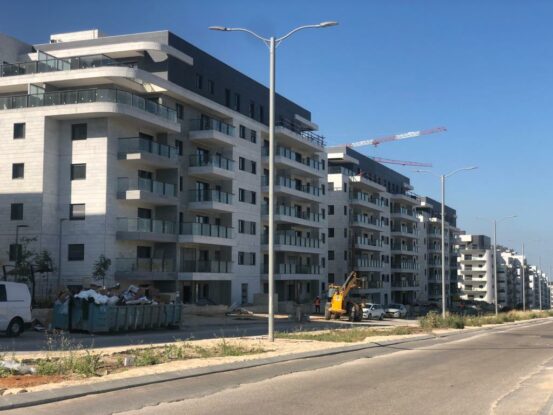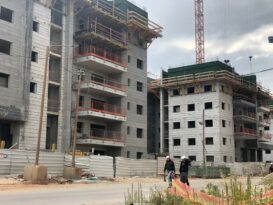Eight years after the start of subsidized home purchase programs, the government is expected to reduce the scope of the discount by hundreds of thousands of shekels. Meanwhile, the Knesset and the OECD published critical opinions on the “Target Price” program, accusing it of exacerbating the housing crisis and widening gaps.
The government’s subsidized housing programs for first-time home buyers were first introduced to the Israeli housing market in 2015 and have since become an integral part of it – whether it is the Buyer’s Price initiated by former Finance Minister Moshe Kahlon, former Housing Minister Yaakov Litzman’s Reduced Price Housing or former Housing Minister Zeev Elkin’s Target Price. In all of them, the same principle operates – tens of thousands of apartments a year marketed through a lottery to those defined as eligible by the Ministry of Housing – married couples, or singles over the age of 35, who do not own a home.
Interestingly, current Housing Minister Yitzhak Goldknopf does not intend to initiate a new reduced-cost housing program of his own and continues to implement his predecessor’s Target Price program. Registration is currently underway for another huge lottery, totaling 7,000 apartments, of which 1,200 are in Petah Tikva, 900 in Be’er Yaakov, 750 in Elad, and 650 in Rishon LeZion, among other cities. Nevertheless, a significant change in the initiative is expected to take place soon, which will lead to a significant reduction in the benefit, amounting to hundreds of thousands of shekels per apartment. This followed a budget agreement between the Ministry of Finance and the Ministry of Construction and Housing, within the framework of the state budget for the years 2023-2024.
The indexation to December 2020 prices will be canceled
In order to explain how the discount will be reduced, it is necessary to explain the mechanism by which the price of apartments is determined by the initiative. Target price tenders include a certain proportion of apartments at a discounted price determined by the state in advance. When the developer approaches the tender, he knows that these apartments will be sold at a price set by the government to the buyers of the apartments that will be entered in the lottery, and accordingly, offers a price for the land.
In July 2021, when the subsidized housing initiative was first approved, it was determined that the price of the apartments would be set at a level of 20% below the market price – up to a maximum discount of NIS 300,000. That means, even when a 20% reduction reflects a NIS 400,000 discount in the price – the price of the apartment will only be discounted by NIS 300,000, seemingly still a solid discount. However, the volume of discounts today should be much higher. This is because the 20% discount was calculated based on home prices of December 2020, and today, two and a half years later prices have increased by tens of percent. With a 20% discount today, buyers should receive a benefit that is much greater than NIS 300,000, sometimes reaching 700,000-800,000 shekels, even approaching a million shekels.
According to the change that has now been approved between the Ministries of Housing and Finance, the linkage to December 2020 prices, from which the discount for the subsidized housing will be derived, will cease, and instead, in each tender, the discount will be calculated relative to current home prices. Since prices have risen sharply since December 2020, this is, of course, a significant increase of hundreds of thousands of shekels for subsidized apartments. In order to moderate the jump in price, it was agreed that home prices would be set at a discount level of 25% relative to the market price (and not 20% according to the earlier version), up to a maximum discount level of NIS 500,000 (instead of NIS 300,000). However, it is important to emphasize that even after these modifications, this is still a significant increase in price.
“The program increases gaps”
At the same time, criticism of the government’s subsidized housing initiatives is intensifying. From day one, economists have been critical of these procedures, mainly because they encourage demand. Indeed, the huge discounts of half a million shekels or more for the purchase of an apartment that characterized these promotions led many households that had not previously thought about buying an apartment to register for lotteries in order to purchase one.
In recent weeks, two documents critical of the initiative have been published, one after the other. One of the Knesset Research Center, and the other of the OECD.
The Knesset Research Center document was written ahead of a discussion in the Interior and Environmental Protection Committee. According to the report, housing prices did not decline during the period of initiation of reduced-cost housing programs – and thus the program did not achieve one of its fundamental goals. Moreover, in 2022, with the decline in the share of discounted homes, there was a surge in the home price index. It was also found that the benefit of the program has regressive characteristics and that it increases gaps. In other words, while in central cities the discount reached hundreds of thousands of shekels, mainly for buyers of households from high-income deciles with the ability to purchase an apartment at a relatively high price; In peripheral cities, the discount is relatively low and is intended mainly for households in low-income deciles. “Therefore, it appears that the plan led to an increase in the gap in the distribution of wealth in Israel,” the document states.
According to the report, between 2015 and June 2020, the loss of state revenues amounted to NIS 7.3 billion. Most of the budgetary cost is not on the expenditure side but on the loss of revenue, that is, it does not affect the expenditure limit. “One may ask whether such a high-fiscal cost plan is indeed economically justified, and if there was no reason to direct this loss of revenue to increase supply and solving infrastructure barriers in high-demand areas,” it said.
OECD: “Fear of worsening the housing problem instead of solving it”
The OECD’s criticism was written as part of the two-year economic survey on Israel published by the OECD in early April. Regarding the government-subsidized housing programs, it said that “without increasing supply in the market, such a move, which encourages demand, raises fears of exacerbating the housing problem rather than solving it.” It added that “selective marketing of apartments below market prices may also lead to a ‘confinement effect’ that impairs residential mobility, and therefore also work mobility and economic opportunities.”
Despite the high pace at which the government’s subsidized housing program continues to operate, it seems that slowly its shortcomings—chief among them increasing the pressure on demand for apartments and reducing the supply of new homes not intended for young couples—are beginning to permeate consciousness. Reducing the scope of the discount is expected to make it less attractive than in the past and may affect those who did not think in advance about buying an apartment, not to register for the reduced-cost housing programs just because of the benefit.
Interested in special offers and discounted new projects across Israel? Whether you’re purchasing a vacation apartment or retirement residence, making a financial investment, or thinking about Aliyah, drop us a line, when you’re ready to talk. Whatever the reason, Buyitinisrael!







